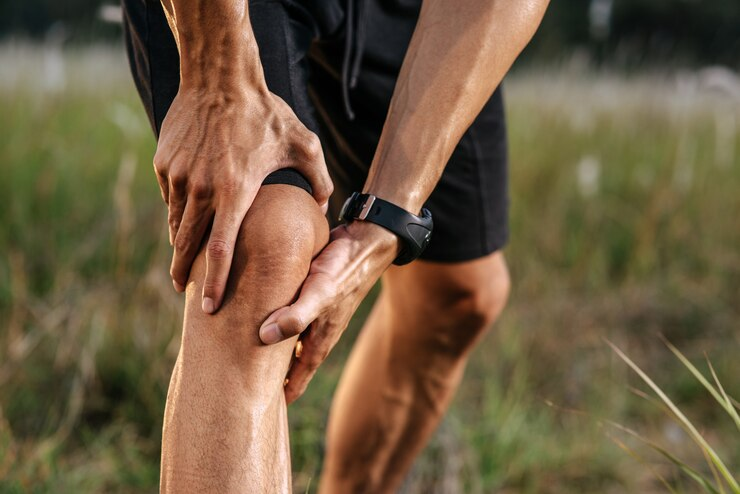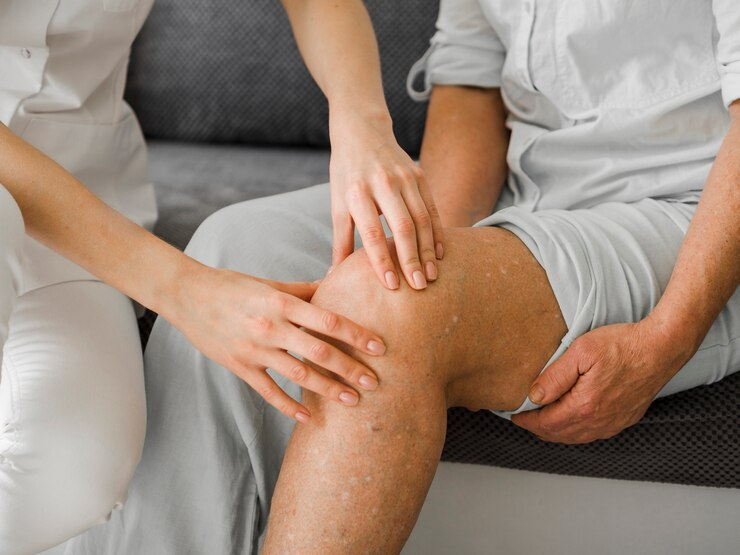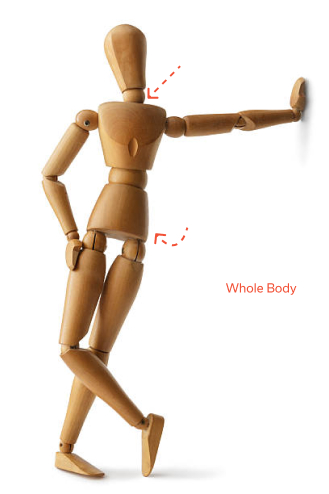Addressing Sharp Knee Pain: Identifying Causes and Seeking Relief
By Nigel ChuaSharp knee pain can be debilitating, affecting mobility and overall quality of life. It can disrupt everyday activities and potentially lead to serious knee injury. Understanding the root causes of this discomfort is important for effective treatment and relief.

Knee bone problems and the surrounding nerve irritation usually cause knee pain. That sharp stabbing pain in one or both knees can also be a result of a soft tissue injury, or worse, more severe fractures.
In this article, we'll explore the 15 most common causes of sharp knee pain and an overview of treatments and relief options to help you regain comfort.
15 Most Prevalent Reasons for Sharp Knee Pain
The knee joint comprises bones, ligaments, cartilage, muscles, and tendons, collectively facilitating weight support, standing, and walking. Being a pivotal joint bearing a significant body weight, the knee is frequently prone to sharp pains and injury.

The good news is, the most common sharp knee pain and injuries can be treated through physiotherapy. Physiotherapy knee pain facilities in Singapore offer a comprehensive range of treatments and exercises aimed at alleviating knee pain and promoting long-term knee health without invasive surgery or painful injections.
Identify the source of your knee problems early. If you have been feeling sharp knee pains for a while now, you may be suffering from one of the following causes.
1. Knee Fracture
A broken bone can inarguably cause sharp, intense pain, particularly when bearing weight or moving the joint. During rest, the pain tends to be dull or characterized as an ache.
The fibula, the smaller of the two shin bones, is the most commonly fractured bone. A high fibula fracture may induce sharp stabbing pain on the outer side of the knee. Fractures affecting the tibial plateau or femoral condyles typically manifest as sharp stabbing pain in the knee. Conversely, a patellar fracture, resulting from trauma or direct impact on the kneecap, is less common.
2. Knee Cartilage Tears
Torn cartilage in the knees, such as meniscus tears, can lead to sharp stabbing pain, especially during twisting movements.
Thick cartilage covers the surface of each knee bone, enabling smooth, pain-free movement by acting as a spacer between joints, minimizing friction as it moves. Additionally, knee cartilage absorbs shock, reducing forces transmitted through the knee during activities like running and jumping. Damage to this cartilage can cause small fragments to tear off and become lodged in the joint.
3. Knee Bursitis
Inflammation of the knee bursa can result in sharp knee pain, typically exacerbated by activities like climbing stairs or kneeling.
These tiny fluid filled sacs reside near the knee joints, shielding bones and tissues from friction. Irritation of these sacs can induce pain that improves with rest.
4. Rheumatoid Arthritis
Joint diseases like rheumatoid arthritis and osteoarthritis afflict around 40% of people in Singapore, with age being a significant risk factor for its development. Unlike osteoarthritis which is a wear-and-tear disease, RA is an autoimmune condition. This means if your immune system mistakenly attacks healthy cells, it can result in painful swelling in the affected areas of the body, primarily targeting multiple joints at the same time.
RA in the knees can manifest from mild to intense throbbing and sharp pain. Common symptoms include warmth, stiffness, or joint locking, particularly in cold weather or upon waking in the morning.
5. Patellofemoral Pain Syndrome
Characterized by pain behind or around the kneecap, patellofemoral pain syndrome can lead to sharp stabbing knee pain, especially during physical activities.
Three common causes of patellofemoral joint pain are the following:
- Runner's Knee
- Chondromalacia Patella
- Patella Alta
These conditions typically cause sharp pains in the front knee during activities like climbing stairs, running, or squatting. The pain is usually absent when at rest but returns during physical activity.
6. Soft Tissue Injuries
Injuries to the soft tissues surrounding the knee, such as ligament sprain or strains, can result in sharp pain and instability. Sharp stabbing knee pain usually occurs due to damage to the cartilage lining the knee joint or inflammation in the knee bursa.
Phoenix Rehab provides a comprehensive solution to soft tissue injuries, chronic knee pain, and other knee joint issues through a specialized treatment plan and expert guidance. This plan includes effective therapies and rehabilitation strategies tailored to your specific needs.
7. Medial Collateral Ligament (MCL) Tears
Tears in the MCL can lead to sharp knee pain, particularly along the inner side of the knee. MCL tears in the ligament can vary in severity. It can be partial, meaning only some ligament fibers are torn, or complete, where the ligament is torn into two separate pieces.
8. Meniscus Tear
Meniscus tears can cause sharp pain and may result in a clicking sensation during movement. A telltale sign of this injury is sharp pain along the knee joint line, either on the inner (medial) or outer (lateral) side. This pain intensifies with movements like deep squatting or twisting of the knee. It usually comes and goes and may be accompanied by swelling.
9. Runner's Knee
Also known as patellar tendonitis, a runner's knee can result from a structural defect or an abnormal walking or running pattern. Symptoms commonly include sharp pain, along with rubbing, grinding, or clicking sounds in the kneecap area.
While some may experience sudden, sharp pain with the runner's knee, others contend with chronic discomfort characterized by a persistent dull ache.
10. Dislocated Kneecap
A dislocated kneecap can lead to sharp pain in the front knee, intense pain, and may require medical intervention to relocate the patella.
If you struggle with a dislocated knee, you may want to avoid standing or putting pressure on the knee joint. Despite the pain dulling over time, it does not necessarily indicate healing. The kneecap will usually be painful to touch, with localized tenderness.
11. Nerve Irritation
Irritation of the nerves around the knee can result in sharp shooting pain or a burning sensation. Nerve pain originating in the knee can stem from various sources, including the lumbar spine, pelvis, or localized nerves within the knee itself.
Additionally, it can manifest following an irritation from previous knee surgery or be indicative of knee arthritis.
12. Loose Bodies
Floating bone fragments or loose bodies in the knee joint A loose body refers to small fragments of articular cartilage that detach within the knee joint due to injury or degeneration. These floating bone fragments within the knee joint may interfere with normal knee movement due to these symptoms:
- sharp knee pain
- knee catching
- knee locking
- knee swelling
13. Septic Arthritis
Septic arthritis occurs when bacteria, viruses, or fungi infect the joint fluid and tissues. This infection can lead to symptoms including:
- sharp knee pain
- fever
- obvious swelling
- redness
- warmth
Prompt medical attention and treatment are essential to prevent joint damage.
14. Knee Gout
People with gout in one or both knees actively experience sharp pain, along with noticeable swelling and redness in the affected joint during a gout attack. These symptoms manifest suddenly and persistently, with pain intensifying rapidly within the first 24 hours, lasting for up to two weeks.
The excruciating pain knee gout causes can significantly impact daily activities and mobility, making prompt treatment essential for managing symptoms and preventing future attacks.
15. Repetitive Stress
Overuse injuries in the knee occur due to repetitive microtrauma caused by physical activity and exercise surpassing the tissue tolerance of the affected structure. These repetitive forces exert less intensity than the acute pain threshold but affect muscles, tendons, cartilage, or bone, commonly affecting people with physically demanding jobs and athletes.
Sharp Knee Pain Treatments and Relief
When experiencing sharp knee pain, seek appropriate treatment for relief and recovery before opting for invasive surgery or injection. Here are some common approaches
- RICE Method: (Rest, Ice, Compression, and Elevation) is a widely recommended home treatment approach for managing sharp knee pain. In addition to ice therapy, resting the affected knee, applying compression with a bandage or brace, and elevating the leg can further reduce inflammation and promote healing. This holistic approach helps relieve discomfort and facilitates recovery for various knee problems.
- Anti inflammatory Medication: Over-the-counter or prescribed anti-inflammatory medications can help reduce pain and swelling.
- Physical Therapy: Targeted exercises and stretches prescribed by physio specialists can strengthen the muscles surrounding the knee and improve flexibility. Physical therapy is even effective for chronic knee pain without injections or surgical interventions such as arthroscopy, ligament reconstruction, or knee replacement.
Summary
Sharp knee pain can significantly impact your daily life, but understanding its causes and seeking appropriate treatment can lead to relief and improved mobility.
Various options are available to address sharp knee pain and help you regain comfort and functionality in your knees. If you're experiencing persistent or severe knee pain, consult with a trusted physio specialist early for quick healing and better outcomes.
Browse other articles by category
 PHYSIOTHERAPY
PHYSIOTHERAPY
 Hand Therapy
Hand Therapy
 Alternative
Alternative
 Massage
Massage
 Traditional Chinese Medicine Treatment
Traditional Chinese Medicine Treatment
 Rehab
Physiotherapy For Upper Back Pain
Physiotherapy For Shoulder Pain
Physiotherapy for Knee Pain
Physiotherapy For Slipped Disc
Orthopedic Doctors, Insurance & Healthcare
Rehab
Physiotherapy For Upper Back Pain
Physiotherapy For Shoulder Pain
Physiotherapy for Knee Pain
Physiotherapy For Slipped Disc
Orthopedic Doctors, Insurance & Healthcare
 Physiotherapy For Lower Back Pain
Physiotherapy for Neck Pain
Frozen Shoulder
Physiotherapy for Back Pain
Physiotherapy For Lower Back Pain
Physiotherapy for Neck Pain
Frozen Shoulder
Physiotherapy for Back Pain

 Whatsapp us now
Whatsapp us now